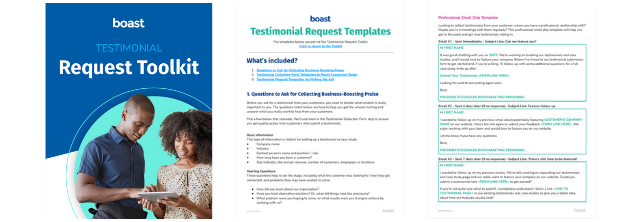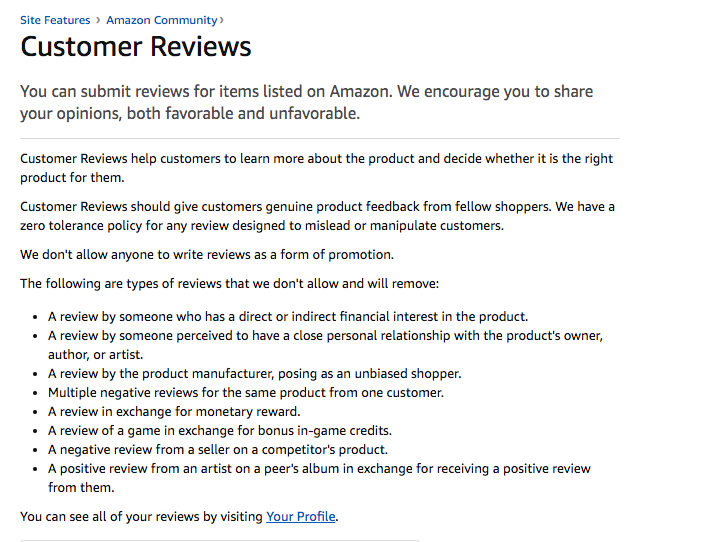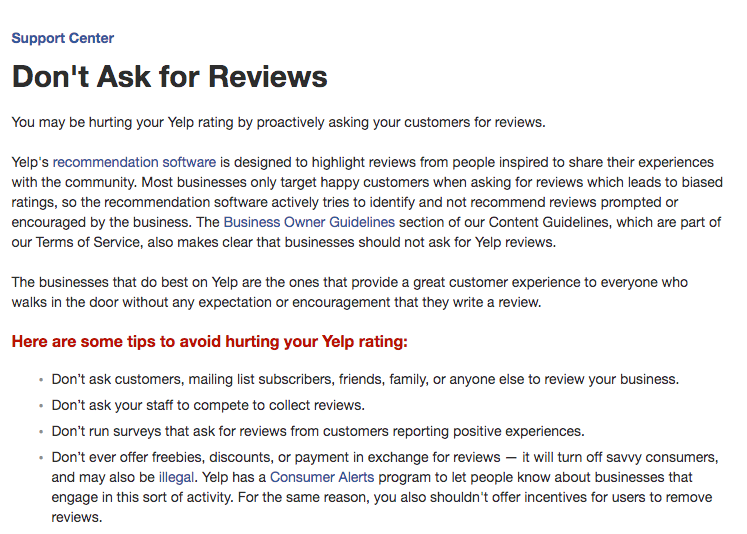Ftc Stops False Advertising Phony Reviews by Online Trampoline Sellers
Launching a production or starting a business is hard. You've spent time and money to brand something peachy, simply no one is paying attention. You need to get noticed, so you find yourself in a gray area, asking; Are paid or false testimonials illegal? How illegal are they? Will I get defenseless?
You're certainly not the beginning nor the last to ask these questions. We've addressed some of the most common questions virtually paid and false testimonials and provided solutions to aid you solve these problems while maintaining your ideals. This post also includes rules from prominent websites, such equally Google, Amazon, and Yelp, forth with social media sites. Nosotros refreshed this blog mail service in October 2021 to include updated information.
Note: This is non a comprehensive list or legal advice. If y'all have questions, always consult an attorney.
Are Paid or Faux Testimonials Illegal? Questions and Solutions
Are Simulated Testimonials Illegal?
Yes.
Under xv Us Code § 45, the Federal Merchandise Committee (FTC) has the ability to terminate and penalize parties "using unfair or deceptive acts or practices in or affecting commerce." This makes it a law-breaking to break official rules imposed by the FTC. And the FTC forbids the use of imitation testimonials.
Dozens of FTC documents explain the details of "misleading advertisements," but it boils down to a uncomplicated Truth in Advertising statement; "When consumers see or hear an advertisement, whether it's on the Cyberspace, radio or tv, or anywhere else, federal law says that ad must be truthful, non misleading." The FTC had made a number of guides explaining how truth in advertising works in dissimilar situations, but fake testimonials are really illegal under Section 5 of the FTC Act (xv USC 45).
Imitation testimonials are considered simulated or deceptive advertising—and therefore confronting the law—for several reasons. Commencement, they are not based on a existent client'southward experience, which a testimonial must exist. Second, it misleads the customer. Claiming a happy customer exists when they don't is misleading in itself, merely whatsoever the fake testimonial claims is likewise misleading. Third, it encourages customers to spend money on a product or service they otherwise might not, thereby financially defrauding the client, which is an especially notable criminal offence for the FTC.
Featured Resource: Testimonial Asking Email Templates

Download the Testimonial Request Toolkit
Are Simulated Testimonials Illegal on Third-Party Websites?
Yes.
Reviews and testimonials on sites similar Google, Yelp, and Amazon tin become a long fashion towards increasing a businesses' popularity. Some business organization owners have been tempted to create false reviews on these sites. Not only is this do forbidden past the FTC, but these websites as well take a hard stance against it.

Fake reviews decrease the overall reputation of the site itself and brand users less likely to trust it. For this reason, among others, every major review site, including Google, Amazon, Yelp, TripAdvisor, and others, have all clearly stated that reviews must be true statements past real customers.
Are Fake Testimonials Illegal on Social Media?
Yes.
Social media has become a prominent tool for marketing. This includes sharing reviews and testimonials. With the ease of sharing data to be seen by millions, social media may seem like the get-to place to create fake testimonials or reviews. Even so, the FTC'south rules however utilize hither and expressly forbid fake testimonials, reviews, and endorsements on social media.
Recently, the FTC sent a notice of penalty to more than than 700 companies, including Amazon.com Inc. and Facebook Inc, for imitation reviews and misleading endorsements online. At that place is a fine line between authentic content and advertising when it comes to social media. This has led to an increase in deceptive endorsements across various social platforms.
The rise of Influencer Marketing is a large contributing cistron to the recent penalities. The company and endorser need to understand the rules and guidelines in place to ensure the endorsement is stated clearly for all to see. To assist businesses and influences, the FTC has put together a guide for advertising endorsements.
How Do I Go My First Testimonials?
Many businesses utilize imitation testimonials when they don't have any of their own, ofttimes when they're new. This is a crime. Information technology's deceptive to customers, unfair to competitors, exposes yous to liability, and isn't practiced for your reputation. So what can you do instead?
Develop a arrangement to go your first testimonials
- If y'all have a new production, try getting your commencement testimonials before you launch. Talk to your product testers. These people helped you make the production great, and their input may aid convince other customers too. Since yous're giving these people the product for free, brand sure you lot disclose this.
- If you accept a new business organization, get your first testimonials with your grand opening issue. Gear up a kiosk, manus out surveys, deport a contest or giveaway, or enquire your first visitors to share their experience. A testimonial collection tool like Boast makes it piece of cake to capture testimonials using a laptop reckoner, tablet, or smartphone at your grand opening.
- If you're combating bad testimonials or reviews, evidence you have stock-still the trouble and demonstrate it. If you accept a business, hold a celebratory event and capture testimonials there. If yous sell a product, requite away some costless samples, but make sure you're post-obit the rules of honest testimonials. Appeal to your existing customers in an electronic mail or social media campaign.
- Recall, not all bad testimonials are bad news. Companies with 100% glowing reviews make customers suspicious. A few critical comments will evidence that you are not using fake testimonials or deceptive advertising.
Featured Resource: Testimonial Request Email Templates

Download the Testimonial Asking Toolkit
Are Paid Testimonials Illegal?
Yes, with some exceptions.
Many of the aforementioned laws which make false testimonials illegal besides make paid testimonials illegal. There are some differences, however, since paid testimonials can be based on real customer experiences.
The FTC's "Guides Concerning the Use of Testimonials and Endorsements in Ad" address how 15 USC 45 applies to testimonials, including paid testimonials. These guides and others lay out legal (and illegal) practices for testimonials or reviews on sites like Yelp, TripAdvisor, Google Business Reviews, and others, every bit well as any testimonials y'all use in advertisements, on your website, or elsewhere.
Co-ordinate to these guides, legal testimonials must adhere to all of the following;
- Made by a real customer or user of the product or service
- Based on a real user'south experience
- Be an accurate clarification of expected or normal results
- Not influenced by coin, gifts, or publicity unless it is clearly disclosed
- Non influenced past a familiar or business organisation relationship (such as employer-employee)
- Non edited or altered so to change the message
This means paid testimonials are illegal unless; the company or person giving the testimonials clearly states they are beingness paid and the statement is still true and accurate. The FTC also makes it clear that gifts such as a free trial of the product or service, a gift carte du jour, a giveaway, or any other incentive are a "material human relationship" that must exist disclosed.
Are Paid Testimonials Illegal on Tertiary-Party Websites?
Yep, with no exceptions.

While the FTC allows paid testimonials as long every bit the testimonial is still a existent account by a real client, tertiary-party sites take a harder stance on this. On Google, Amazon, Yelp, and other major review sites, paid testimonials are expressly forbidden.
Google's review policies are clear on this affair. They explicitly state in their review guidelines: "Don't offering or take coin in exchange for reviews."
Amazon's review policies are also clear. They do not permit reviews in exchange for products, money, rewards, or other reviews.
Yelp actually takes a business firm opinion over the previous ii. Not but do they forbid paid reviews, just they forbid asking for reviews birthday. Yelps states in their Guidelines: "Don't ask for reviews and don't offering to pay for them either: Please don't inquire your customers to review your concern on Yelp. … Y'all should also never offer compensation (discounts and freebies count too) in exchange for reviews."

Though these are only three of the dozens of different review sites, it'south unlikely y'all'll find one that does accept paid reviews. With the leading review sites taking this opinion, other, smaller sites probably won't fight the tendency. Moreover, allowing paid reviews would tarnish the reputation—and therefore the value—of the site.
Are Paid Testimonials Illegal on Social Media?
Yep, with some exceptions.
As we discussed previously, social media is a primary tool to share branded content. Social media sites like Facebook and Instagram identify the responsibility on the endorser to tag the concern when there is an exchange of value. Additionally, sites similar Twitter require you to include #advertising to inform people the endorsement is paid. Exist sure to check each social media site's rules regarding branded and endorsed content to ensure your paid testimonials are legal.
Apart from the private social sites rules and guidelines, the FTC guide applies too. Every bit we stated above, legal paid testimonials and endorsements must adhere to all of the post-obit;
- Made by a real customer or user of the product or service
- Based on a real user's feel
- Be an authentic description of expected or normal results
- Not influenced by money, gifts, or publicity unless it is clearly disclosed
- Non influenced past a familiar or business human relationship (such as employer-employee)
- Not edited or contradistinct so to change the message
How Practise I Get Customers to Leave Reviews?
Getting a customer to take time out of their day to leave a review can be tough. Customers have a lot of demands on their time, and so how can y'all compete without a payment?
- Go above and beyond. If you truly deliver an exceptional client service experience and so enquire for a testimonial, many customers volition oblige.
- Forge a relationship. Find out what your customers care most and give information technology to them. Are they looking for a company with good ethics? Someone with knowledgeable experts? Personal service? Delightful ambiance? The customers that repeatedly buy, visit, or work with you for a long fourth dimension are the customers that support y'all and will give testimonials.
- Make it piece of cake. Brand your customers equally comfortable as possible when giving reviews. Provide question prompts, so they don't accept to search for something to say. Allow them to share a testimonial with just a few clicks.
- Ask at the right time. When a customer comes in for an engagement or a regular visit, inquire if they take a infinitesimal to share their thoughts. Or, if an online buy was completed, enquire for a testimonial when you ask how their experience was. (If you are asking for reviews for a third-party site, make sure the site allows this practice).
- Be sincere. While paid and false testimonials rely on deception, real testimonials allow you to just be yourself. Tell the customer what you call up of your relationship and why their public approving is important to you.
- Have a system and a plan. Testimonials don't just happen; you take to ask for them. Accept a plan and arrangement for gathering and managing testimonials, such equally an automatic email campaign, an in-person script, or a video app like Avowal.
Featured Resources: Testimonial Request Email Templates

Download the Testimonial Request Toolkit
How Illegal Are Paid or Imitation Testimonials?
And so paid and simulated testimonials are against the constabulary, merely only how illegal are they? What's the penalty?
Thousands or millions of dollars in penalties and civil suits.
Each FTC violation is subject area to a $x,000 penalty under fifteen USC 45. And it doesn't end there; in that location's also a fine of $41,484 each day a deceptive advertizement runs. For many large corporations, this might not be enough to stop paid or fake testimonials. The FTC can and has filed civil deportment against larger businesses with judgments in the millions of dollars. The more widespread, deliberate, misleading, or damaging a deceptive ad is, the bigger the civil case will be. The FTC can also order businesses to admit to and correct deception or return money to consumers they deceived.
In 2019, the FTC fined a business organization 12.8 1000000 for buying fake Amazon reviews. This was the first time the FTC entered the battle confronting fake Amazon reviews, but it's unlikely to be the terminal.
What Almost Paid or Fake Testimonials on Third-Party Sites?
Besides being confronting the constabulary, businesses that host reviews and testimonials are too fed up. They've changed their terms of service agreements to stop incentivized reviews altogether, and they'll remove or flag reviewers or businesses who violate the agreements. Amazon sued over 1,000 offending businesses, reviewers, and sites in 2015. Yelp also sued, bringing offending companies and reviewers to court for fraud.
What Nearly Paid or Fake Testimonials on Social Media?
In March 2020, Teami LLC, a detox tea company, settled a lawsuit with the FTC regarding "deceptive wellness claims and endorsements by well-known social media influencers who did non fairly disclose that they were being paid to promote its products." The FTC imposed the tea company with a $15.2 million judgment, which was suspended to an upfront payment of $1 million, based on the Teami LLC'due south inability to pay the full judgment.
Will I Get Defenseless?
Paid and fake testimonials are illegal, and they tin behave harsh penalties. But some business concern owners still inquire, will I get caught?
Almost likely, yes.
The FTC's weblog is filled with hundreds of cases they've brought confronting small and big businesses. Large businesses like Volkswagen, small B2C trampoline sellers, B2B freight brokers, marketing companies, and many more have all been caught using paid reviews or fake testimonials to deceive consumers, and they've paid thousands, even millions of dollars. And there are likely many other cases that don't brand information technology to the web log.
Many of these cases are first brought to the FTC'south attention past suspicious or angry customers, competitors, third-political party websites, consumer protection groups, or local governments. Regional FTC offices and investigators address complaints and sometimes work with local law enforcement or district attorneys to stop deceptive practices locally. Third-party sites follow users' trails to track down fraudsters and file ceremonious suits against them or create an automated screening procedure to prevent fake testimonials.
Customers have also taken notice of paid and fake reviews. Several plugins and apps now exist that volition point out simulated reviews equally customers shop online. These plugins take annotation of generic terms, grammar mistakes, or other mutual red flags that aren't present in existent, trustworthy reviews.
In essence, if it'due south making a difference in customers' minds, the FTC, other websites, or other customers will observe. And if it's not making a deviation, is it worth putting your reputation on the line for?
Featured Resource: Testimonial Request Email Templates

Download the Testimonial Asking Toolkit
Earlier you first asking if paid or fake testimonials are legal, ask yourself if it'due south worth information technology. There are many ways to get existent, honest testimonials and win real customer blessing without sacrificing your reputation.
Posted in: Testimonials
Source: https://boast.io/paid-fake-testimonials-illegal/
0 Response to "Ftc Stops False Advertising Phony Reviews by Online Trampoline Sellers"
ارسال یک نظر